时间状语从句的翻译和强调句的填空练习
根据英语时间状语从句讲解及练习(简化版)

根据英语时间状语从句讲解及练习(简化版)一、什么是时间状语从句时间状语从句是由连词引导的从句,用来表示一个动作或状态发生的时间,它可以在句子中充当状语,起到修饰或限定其他句子成分的作用。
二、几种常见的时间状语从句及用法1. when当...时候例句:He was studying in the library when the earthquake happened.译文:地震发生时,他正在图书馆研究。
2. while当...的同时例句:I was cleaning the house while my sister was cooking.译文:我正在打扫房子,而我妹妹正在做饭。
3. as soon as一...就...例句:She called me as soon as she arrived home.译文:她一到家就给我打电话。
4. before在...之前例句:Please finish your homework before you go out to play. 译文:在你出去玩之前,请完成你的家庭作业。
5. after在...之后例句:He went to bed after he watched the movie.译文:他在看完电影之后上床睡觉。
6. until直到...例句:They played basketball until it got dark.译文:直到天黑之前他们都在打篮球。
三、时间状语从句练1. _______ he finishes his work, he will join us for dinner. (when)译文:当他完成工作时,他会加入我们共进晚餐。
2. I fell asleep _______ I was reading a book. (while)译文:我边看书边睡着了。
3. We will go shopping _______ the rain stops. (as soon as)译文:一雨停,我们会去购物。
时间状语从句讲解和练习(答案)

时间状语从句用句子表达一件事情或一个行为发生的时间,这个句子就叫时间状语从句。
时间状语从句根据其所表示的时间不同,所使用的连词也不同。
下面我们一起来看一下几个常见的时间状语从句:1.when引导的从句:表示主句的动作和从句的动作同时发生,或从句的动作发生在主句动作之前。
例如:I was going out when a visitor came. (动词动作同时发生。
)我正要出门,有客人来访。
I shall tell her the good news when she comes.她来时,我将告诉她这个好消息。
小试牛刀:I found mother cooking for me. I got home.(when)_______________________________________ He was listening to the radio when I home. (get)2.while 引导的从句:表示“当……过程中”,强调某一段时间内主句和从句中谓语动词所表示的动作在同一时期发生。
由于while从句表示一个持续的行为,所以从句中要用持续性动词,并且持续性动词常用进行时态。
例如:Keep an eye on my little sister while I am away.我不在时,请照看一下我的小妹妹。
While we were watching TV, Jim came in. 我们看电视的时候,Jim进来了。
小试牛刀:It started to rain. We were playing football.(while)_______________________________________ Lucy was cleaning the room Lily was listening to music.3.as引导的时间状语从句:表示“当……的时候;一边……一边……;随着……”,其从句的主语与主句的主语往往是同一人或物。
完整word版高中时间状语从句及练习
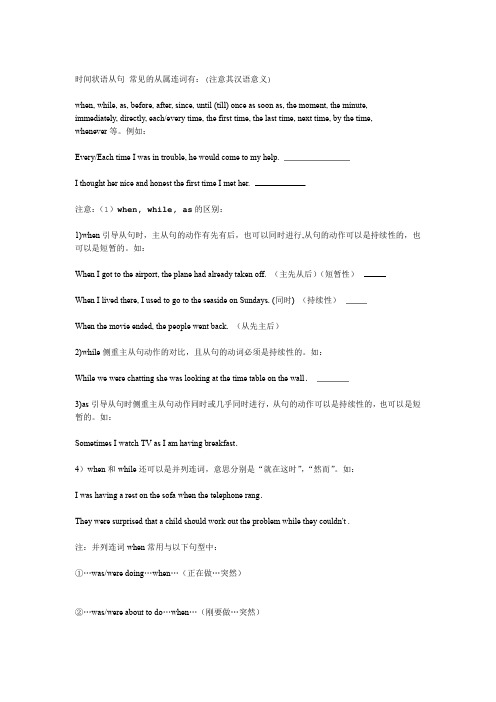
时间状语从句常见的从属连词有:(注意其汉语意义)when, while, as, before, after, since, until (till) once as soon as, the moment, the minute, immediately, directly, each/every time, the first time, the last time, next time, by the time,whenever等。
例如:Every/Each time I was in trouble, he would come to my help.I thought her nice and honest the first time I met her.注意:(1)when, while, as的区别:1)when引导从句时,主从句的动作有先有后,也可以同时进行,从句的动作可以是持续性的,也可以是短暂的。
如:When I got to the airport, the plane had already taken off. (主先从后)(短暂性)When I lived there, I used to go to the seaside on Sundays. (同时) (持续性)When the movie ended, the people went back. (从先主后)2)while侧重主从句动作的对比,且从句的动词必须是持续性的。
如:While we were chatting she was looking at the time table on the wall.3)as引导从句时侧重主从句动作同时或几乎同时进行,从句的动作可以是持续性的,也可以是短暂的。
如:Sometimes I watch TV as I am having breakfast.4)when和while还可以是并列连词,意思分别是“就在这时”,“然而”。
高中时间状语从句及练习(含答案)

状语从句状语从句在句中作状语,修饰主句中的动词、形容词或副词等。
状语从句放在主句之前时,常用逗号分开;放在主句之后,一般不用逗号。
状语从句按其意义和作用可分为时间、原因、地点、条件、让步、目的、结果、方式、比较等9种。
1.时间状语从句时间状语从句表示主句动作发生的时间,主要由when,while,as ; before, after; till (until); once, by the time, as soon as, no sooner ... than和hardly ... when及名词词组the moment等引导。
1) when“在……的时候”; while “在……期间”; as “正当……的时候”when意为“在……的时候”,强调“特定时间”。
When spring came, he felt like a trip.When he was eating his breakfast, he heard the doorbell ring.说明:连词when在状语从句中还有如下几种含义:①表示突然发生的事,含义为“(正在……时)忽然”。
I was just coming along to see you when I ran into Wilson.I had been working a couple of months when I had a letter from Jane.②表示过早发生某事,意为“(还没……)就”。
此含义有时可用before代替。
I hadn’t been reading for half an hour when I heard steps outside.我刚读了不到半个小时就听到外面有脚步声。
I had been there little more than a week when I set to work in earnest.③表示“在……的情况下”,常可译为“虽然”,“既然”,“如果”。
(完整版)初中时间状语从句语法及练习

英语时间状语从句讲解(一)when, while 和as 引导时间状语从句的用法一、when 的用法如果只从现象来看,when 从句用的最多的是一般过去时,而主句的时态没有限制,根据具体情况而定。
1. When he was a child he was always trying out new ideas.3. Were you writing when the teacher came in? 老师进来的时候,你在写信吗?4. Sorry, I was out when you called me. 对不起,你打电话来的时候我出去了。
when 从句的重点不在动作本身发生的状态,而只是把它作为一个时间点,所以when 多数情况下用的是一般过去时,则不用正在进行时。
因为如果用正在进行时,它表示的就是一段时间而不是一个时间点了。
根据这一点,有的文章补充说:when 从句的动词大多是瞬时动词。
这种说法也可以参照。
实际上,when 从句也可以有其它的时态,但几乎也不用进行时,因为它也只是作为一个时间参照点。
例如:2. When he had finished his homework, he took a short rest.3. Why do you want a new job when you have got such a good one already?二、while 的用法相比于when 来说,while 从句的侧重点就不一样了。
while 从句的侧重点在于描述动作正在发生的状态,它的意思是:当while 事件正在发生的时候,另一件事如何如何。
所以,while 从句一般用的是正在进行时。
而另一件事的状态没有硬性的要求,根据具体情况而定。
例如:1. While my wife was reading the newspaper, I was watching TV.2. While Jim was mending his bike, Lin Tao came to see him.3. While they were talking, the bell rang. 正在他们谈话的时候,上课铃响了。
【语法专项训练】状语从句翻译专项练习及答案
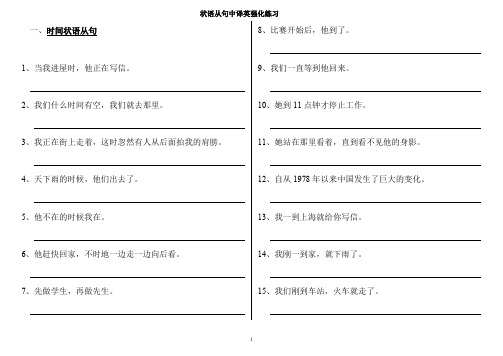
一、时间状语从句1、当我进屋时,他正在写信。
2、我们什么时间有空,我们就去那里。
3、我正在街上走着,这时忽然有人从后面拍我的肩膀。
4、天下雨的时候,他们出去了。
5、他不在的时候我在。
6、他赶快回家,不时地一边走一边向后看。
7、先做学生,再做先生。
8、比赛开始后,他到了。
9、我们一直等到他回来。
10、她到11点钟才停止工作。
11、她站在那里看着,直到看不见他的身影。
12、自从1978年以来中国发生了巨大的变化。
13、我一到上海就给你写信。
14、我刚一到家,就下雨了。
15、我们刚到车站,火车就走了。
16、我们刚开始就被叫停。
17、我每次乘船都晕船。
18、我一听到这首歌,就感到很愉快。
19、下次你来的时候,就会见到他。
二、地点状语从句1、有志者,事竟成。
2、哪里有水,哪里就有生命。
3、你可以随意到你喜欢的任何地方去。
4、无论你去哪都要遵守法律。
三、原因状语从句1、昨天我回来晚了,因为我值班。
2、既然大家都到了,我们开始开会。
3、由于他英语懂得不多,他在字典中查阅这个单词。
4、鉴于天气已经晴朗,我们可以启程了。
5、鉴于他病情严重,我们派人去请医生去了。
四、目的状语从句1、我要把你的电话号码记下来,以免忘记。
2、我把真实情况告诉你,使你能自己作出判断。
3、他们比往常更加努力工作,为了能提前完成工作。
4、多穿点衣服,以免患感冒。
五、结果状语从句1、我们把收音机的音量放大,大家都听到了新闻。
2、他十分激动,以致一句话都说不出来。
3、他说出了这么重要的理由,得到大家的谅解。
4、这是一本十分有意思的书,大家都想看。
六、条件状语从句1、如果我们不怕困难,困难就算不了什么了。
2、除非下雨,我们明天就去那里。
3、只要你努力工作,你就一定能成功。
4、万一我忘了,请提醒我一下。
5、据我所知,那本书下月出版。
七、方式状语从句1、按照我教你的画一只猫。
2、按照人家告诉你做的去做。
3、看上去她好象是生病了。
4、他的行动就好象什么也没有发生。
时间状语从句练习题
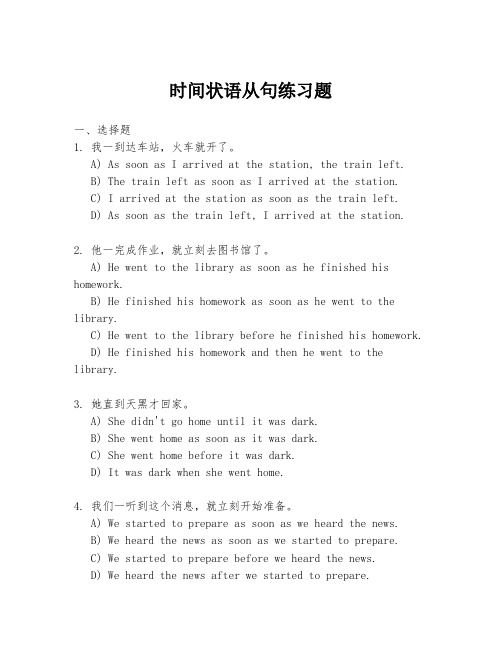
时间状语从句练习题一、选择题1. 我一到达车站,火车就开了。
A) As soon as I arrived at the station, the train left.B) The train left as soon as I arrived at the station.C) I arrived at the station as soon as the train left.D) As soon as the train left, I arrived at the station.2. 他一完成作业,就立刻去图书馆了。
A) He went to the library as soon as he finished his homework.B) He finished his homework as soon as he went to the library.C) He went to the library before he finished his homework.D) He finished his homework and then he went to the library.3. 她直到天黑才回家。
A) She didn't go home until it was dark.B) She went home as soon as it was dark.C) She went home before it was dark.D) It was dark when she went home.4. 我们一听到这个消息,就立刻开始准备。
A) We started to prepare as soon as we heard the news.B) We heard the news as soon as we started to prepare.C) We started to prepare before we heard the news.D) We heard the news after we started to prepare.5. 他们一到达就立刻开始工作。
(完整版)高中时间状语从句语法及练习

(完整版)高中时间状语从句语法及练习时间状语从句是一个复合句结构,用来表示时间关系。
在高中英语研究中,时间状语从句是一个重要的语法点。
本文将为你详细介绍高中时间状语从句的语法规则,并提供一些练题目。
一、时间状语从句的定义和用法时间状语从句是用来表示时间关系的从句,它可以在句子中充当状语。
时间状语从句通常使用连词来引导,常见的引导词有:when, while, before, after, as, since, until, etc. 时间状语从句可以出现在主句的前面或后面。
二、时间状语从句的语法规则1. 当主句的谓语动词表示将来时,时间状语从句中的谓语动词可以使用一般现在时代替一般将来时。
例:I will call you when I arrive home.(主句使用了将来时,从句中使用了一般现在时)2. 当主句的谓语动词表示过去时,时间状语从句中的谓语动词可以使用一般过去时或过去完成时代替。
例:She had finished her homework before she went to bed.(主句使用了过去时,从句中使用了过去完成时)3. 当时间状语从句表示一个惯性的动作或一个客观事实时,从句中的谓语动词可以使用一般现在时。
例:I always go for a walk when it is sunny.(从句中表示惯性的动作)三、时间状语从句的练题目1. 选择正确的连词填空:― She fell asleep _______ she finished her book.1) while 2) because 3) after― We will start the meeting _______ everyone ar rives.1) before 2) since 3) until2. 改写句子,将主句的谓语动词改为表示将来时:― I will call you when I have time.3. 改写句子,将主句的谓语动词改为表示过去时或过去完成时:― He went to bed before he finished his work.以上是关于高中时间状语从句的语法规则及练习题目的详细介绍。
高中时间状语从句及练习(含解答)

高中时间状语从句及练习(含解答)状语从句是用来修饰主句中的动词、形容词或副词等的从句。
当状语从句放在主句之前时,通常需要用逗号分隔;而当放在主句之后时,则不需要逗号。
根据其意义和作用,状语从句可分为时间、原因、地点、条件、让步、目的、结果、方式和比较等九种类型。
1.时间状语从句时间状语从句用于表示主句动作发生的时间,通常由when、while、as、before、after、till (until)、once、by the time、as soon as、no sooner。
than和hardly。
when等引导词,以及名词词组XXX等构成。
其中,when表示“在……的时候”,强调“特定时间”。
例如:When spring came。
he felt like taking a trip.When he was eating his breakfast。
XXX.需要注意的是,连词when在状语从句中还有其他含义。
比如,它可以表示突然发生的事,含义为“(正在……时)忽然”;可以表示过早发生某事,意为“(还没……)就”;还可以表示“在……的情况下”,通常译为“虽然”、“既然”、“如果”等。
举个例子:I was just coming along to see you when I ran into Wilson.I hadn’t been reading for half an hour when I heard steps outside.She refuses help when (although) she has many friends.Why do you walk when (since) you have a car?How can I make them understand if they refuse to listen to me。
It's frustrating when you XXX。
状语从句翻译练习
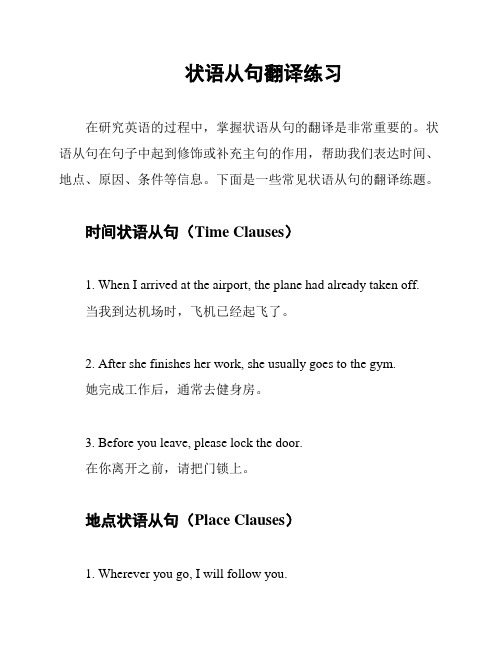
状语从句翻译练习在研究英语的过程中,掌握状语从句的翻译是非常重要的。
状语从句在句子中起到修饰或补充主句的作用,帮助我们表达时间、地点、原因、条件等信息。
下面是一些常见状语从句的翻译练题。
时间状语从句(Time Clauses)1. When I arrived at the airport, the plane had already taken off.当我到达机场时,飞机已经起飞了。
2. After she finishes her work, she usually goes to the gym.她完成工作后,通常去健身房。
3. Before you leave, please lock the door.在你离开之前,请把门锁上。
地点状语从句(Place Clauses)1. Wherever you go, I will follow you.无论你去哪里,我都会跟随你。
2. They decided to have a picnic wherever the weather was nice. 他们决定在天气好的地方野餐。
3. I can work wherever there is an internet connection.只要有网络连接,我可以工作的地方都行。
原因状语从句(Reason Clauses)1. I stayed at home because it was raining heavily.因为下着大雨,我待在家里。
2. He couldn't attend the meeting due to his illness.由于病了,他无法参加会议。
3. They left early in order to catch the train.为了赶火车,他们提前离开。
条件状语从句(Condition Clauses)1. If it rains tomorrow, we will stay indoors.如果明天下雨,我们会待在室内。
高中英语状语从句讲解及练习(含答案)
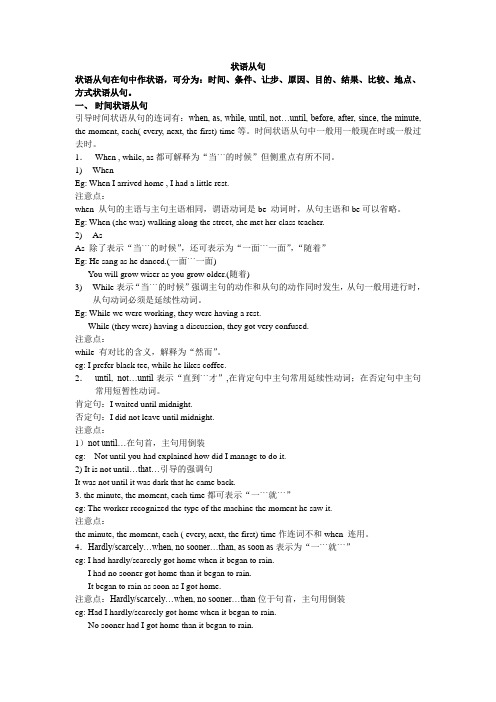
状语从句状语从句在句中作状语,可分为:时间、条件、让步、原因、目的、结果、比较、地点、方式状语从句。
一、时间状语从句引导时间状语从句的连词有:when, as, while, until, not…until, before, after, since, the minute, the moment, each( every, next, the first) time等。
时间状语从句中一般用一般现在时或一般过去时。
1.When , while, as都可解释为“当```的时候”但侧重点有所不同。
1)WhenEg: When I arrived home , I had a little rest.注意点:when 从句的主语与主句主语相同,谓语动词是be 动词时,从句主语和be可以省略。
Eg: When (she was) walking along the street, she met her class teacher.2)AsAs 除了表示“当```的时候”,还可表示为“一面```一面”,“随着”Eg: He sang as he danced.(一面```一面)You will grow wiser as you grow older.(随着)3)While表示“当```的时候”强调主句的动作和从句的动作同时发生,从句一般用进行时,从句动词必须是延续性动词。
Eg: While we were working, they were having a rest.While (they were) having a discussion, they got very confused.注意点:while 有对比的含义,解释为“然而”。
eg: I prefer black tee, while he likes coffee.2.until, not…until表示“直到```才”,在肯定句中主句常用延续性动词;在否定句中主句常用短暂性动词。
高中英语时间状语从句结构完形填空题20题答案解析版

高中英语时间状语从句结构完形填空题20题答案解析版1I am a high school student. I always study hard. When I get up in the morning, I start to review my lessons. After breakfast, I go to school. Sometimes I am late for class. But when I am late, I always apologize to my teacher. While I am in class, I listen carefully and take notes. When class is over, I go to the library to read books.1. I always study hard ___ I want to get good grades.A. becauseB. soC. althoughD. but答案:A。
因为我想取得好成绩,所以我总是努力学习。
because 表示原因,符合语境。
so 表示结果;although 表示让步;but 表示转折。
2. When I get up in the morning, I start to review my lessons ___ I have enough time.A. ifB. whenC. untilD. after答案:A。
如果我有足够的时间,当我早上起床时,我就开始复习功课。
if 表示条件,符合语境。
when 表示当……时候;until 表示直到……;after 表示在……之后。
3. Sometimes I am late for class ___ I miss the bus.A. becauseB. soC. althoughD. but答案:A。
因为我错过了公交车,所以我有时上课会迟到。
初二英语强调句与状语从句结合单选题50题答案解析版

初二英语强调句与状语从句结合单选题50题答案解析版1.It was at 8 o'clock in the morning that I usually go to school.A.thatB.whenC.whileD.as答案:A。
本题考查强调句结构“It is/was+被强调部分+that/who+其他”,这里强调的是时间状语“at 8 o'clock in the morning”,只能用that。
选项B、C、D 都不能用于强调句结构。
2.It was when I was doing my homework that my mother came in.A.thatB.whenC.whileD.as答案:B。
本题考查强调句与时间状语从句的结合。
“It was...that...”是强调句结构,强调时间状语从句“when I was doing my homework”,强调句中被强调部分是时间状语从句,只能用when。
选项A 是强调句结构中的引导词,但这里不是强调结构的引导词。
选项C 和D 也不符合语境。
3.It was while I was reading a book that my father came back.A.thatB.whenD.as答案:C。
本题同样是强调句与时间状语从句的结合。
强调时间状语从句“while I was reading a book”,强调句中被强调部分是时间状语从句,只能用while。
选项A 是强调句结构中的引导词,但这里不是强调结构的引导词。
选项B 和D 不符合语境。
4.It was as I was watching TV that my sister called me.A.thatB.whenC.whileD.as答案:D。
强调时间状语从句“as I was watching TV”,强调句中被强调部分是时间状语从句,只能用as。
高中英语时间状语从句完形填空题30题答案解析版
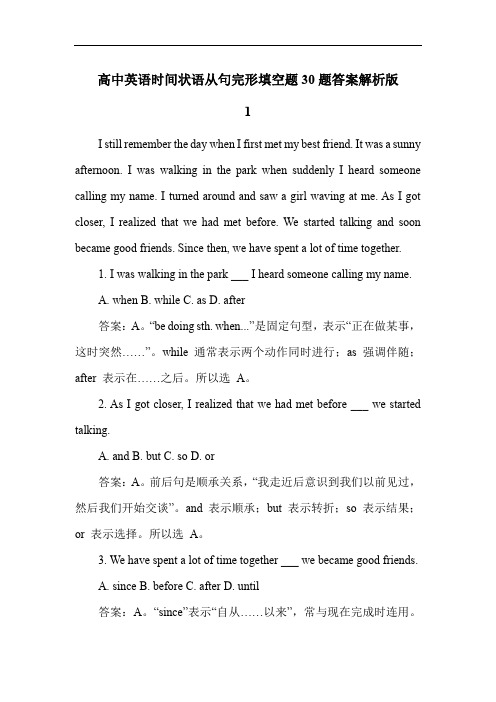
高中英语时间状语从句完形填空题30题答案解析版1I still remember the day when I first met my best friend. It was a sunny afternoon. I was walking in the park when suddenly I heard someone calling my name. I turned around and saw a girl waving at me. As I got closer, I realized that we had met before. We started talking and soon became good friends. Since then, we have spent a lot of time together.1. I was walking in the park ___ I heard someone calling my name.A. whenB. whileC. asD. after答案:A。
“be doing sth. when...”是固定句型,表示“正在做某事,这时突然……”。
while 通常表示两个动作同时进行;as 强调伴随;after 表示在……之后。
所以选A。
2. As I got closer, I realized that we had met before ___ we started talking.A. andB. butC. soD. or答案:A。
前后句是顺承关系,“我走近后意识到我们以前见过,然后我们开始交谈”。
and 表示顺承;but 表示转折;so 表示结果;or 表示选择。
所以选A。
3. We have spent a lot of time together ___ we became good friends.A. sinceB. beforeC. afterD. until答案:A。
强调句时间状语从句条件状语从句让步状语从句
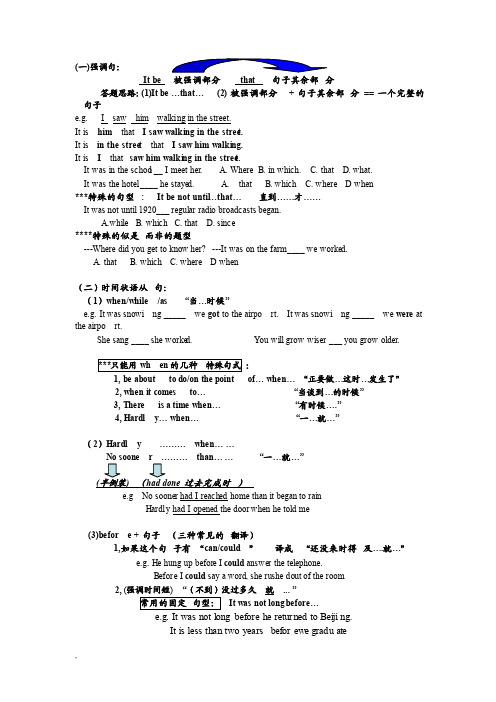
(一)强调句:It be 被强调部分that 句子其余部分答题思路:(1)It be …that…(2) 被强调部分+ 句子其余部分== 一个完整的句子e.g. I saw him walkin g in the street.It is him that I saw walkin g in the street.It is in the street that I saw him walkin g.It is I that saw him walkin g in the street.It was in the school __ I meet her. A. Where B. in which. C. that D. what.It was the hotel____ he stayed. A. that B. which C. where D when***特殊的句型: It be not until…that…直到……才……It was not until1920___ regula r radiobroadc astsbegan.A.whileB. whichC. thatD. since****特殊的似是而非的题型---Wheredid you get to know her? ---It was on the farm ____ we worked.A. thatB. whichC. where D when(二)时间状语从句:(1)when/while/as “当…时候”e.g. It was snowing _____we got to the airport. It was snowing _____we were at the airport.She sang ____ she worked.You will grow wiser___ you grow older.:1, be aboutto do/on the pointof… when…“正要做…这时…发生了”2, when it comesto…“当谈到…的时候”3, Thereis a time when…“有时候….”4, Hardly… when…“一…就…”(2)Hardly ………when……than……“一…就…”(半倒装) (had done 过去完成时)e.g No sooner had I reache d home than it beganto rainHardly had I opened the door when he told me(3)befor e + 句子(三种常见的翻译)1,如果这个句子有“can/could”译成“还没来时得及….就…”e.g. He hung up before I couldanswer the teleph one.Before I couldsay a word, she rushed out of the room2, (强调时间短)“(不到)没过多久就... ”It was not long before…e.g. It was not long before he return ed to Beijin g.It is less than two yearsbefore we graduate3, (强调时间长)“过了多久才... ”e.g. It will be yearsbefor e he succeeds. ///d Wei Fangbefore long 不久;不久以后long before早在┄之前,很久以前(4) since+ 句子(三种常见的翻译)e.g. sinceI am a student /// sinceI was a student /// sinceI got sick.(三)条件状语从句(1)unless(除非) = if + 否定e.g. We shallgo unless it rains.We shallgo if it doesn’trainDon’tcomeunless I phoneyou.I’llstayathomeunless I am invite dYou’llmissthetrain_____y ou hurryup. A. unless B. as C. if not D. until(2)常见的条件连词:once “一旦…”;as/so long as …“只要”;on condition that…”前提是” in case”以防万一”e.g. You should is too late.== (before)Y ou mother will be cookin g in the kitche n, when you get home.== (when _____)We shall it rains.== (unless )get into a bad habit.Y ou will find it hard to get rid of it.== (Once )1. before/when/unless/once/if等, 必须用做连词,描述将来的事,否则没有这种用法comesthis afternoon.will come tomorrow.Y ou will know everythingaboutit when you ____ older. (grow)Y ou will know when everything_____(ready)2. before/when/unless/once/if等引导的从句, 还可以用have done(题)--- When shall we restart our busine ss? --- Not until we ______ our plan.A. will finisheB. are finishingC. finishedD. have finished(四)让步状语从句:“尽管…”;”不论…”;”不管…”as/however/while/though/even if/even though…(1)Whatever & howevere.g. _____the difficultythe problem brings us , we will not give in._____di ffic ult the prolbe m is ,we will not give in.Y ou should not give a child_____he wantsWe will certai nly do ____ it takesto save the animal.(2) 让步内容as其它成分e.g. He is young. He knowsmuch Y oungas he is, heknowsmuch.He tried. He faileHe is a childthree(3) whether… or…“不管…”e.g. Whether you like it or not, you have to finish your homework. 练习题:It was on the Nation al Day___ she met with her sister.A. thatB. whereC. whenD. whichnWho was it _____put so many largestones on the road?A.thisB. thatC. heD. she---When did this accide nt happen?---It was in the mornin g ___ he rode the bike alongthe street .A. thatB. whichC. where D whenAll people, ___ they are old or young, ri ch or poor, have been trying their best to help thosein need sincethe disast erA.even ifB.whetherC. no matterD. howeverIt was _____he said _____disapp ointe d me.A. what, thatB. that, thatC. what, whatD. that, whatIt was only with the help of the localguide___________.A. was the mounta in climbe r rescue dB. that the mounta in climbe r was rescue dC. when the mounta in climbe r was rescue dD. then the mounta in climbe r was rescue dIt was the boy _____had been in prison _____stolethe money.A. who, whereB. that, howC. who, thatD. that, whichIt may have been at Christ mas _____John gave Mary a handba g.A. beforeB. whoC. thatD. when--- Is Mr. Smithin the office?--- Y es,________ he is in charge of the office,he must be there.A. sinceB. howeve rC. whethe rD. for____ot herssay, the expert is sure that his theory is correc tA. No matterB. It doesn’t matterC. Whatev erD. WhatMany places are floode d by heavyrainfa lls, sotheycan’twalk_______ they like thesedays.A. whenB. whenev erC. whereD. wherev erI had worked here ______ you came here. But I shallleavefor Englan d ______.A. before long, before longB. before long; long beforeC. long before, before longD. long before; long beforeScient istssay it may be five or ten years_____it is possib le to test this medici ne on humanpatien ts.A. sinceB. beforeC. afterD. whenNo matter________ hard it may be,I will carryit out.A. whatB. whatev erC. howD. howeve r________ you may do,you must do it well.A. WhichB. Whenev erC. Whatev erD. WhenEnglis h and French are taught here. You can choose ________ you like.A. no matter whichB. whiche verC. whichD. whatev erI’llbebackbefore you ________.A. will leaveB. will have leftC. leaveD. wouldleaveThe proble mwon’tbesettle d untilwe ________ a chance to discus s it thorou ghly.A. have hadB. will haveC. will have hadD. wouldhaveIf you ________ this experi ment,you will unders tandthe theory better.A. will be doingB. have doneC. will have doneD. woulddoWe should finish the import ant job,________.A. long it takeshoweve rB. it takeshoweve r longC. long howeve r it takesD. howeve r long it takes________ comesto the partywill receiv e a gift.A. No matter whoB. WhoC. WhichoneD. Whoeve rIt was not untilmidnig ht ___ the noiseof the street stoppe d.A. thatB. thisC. sinceD. at whichWas it in 1969 _____he succee ded _____landin g on the moon?A. when, onB. that, onC. when, inD. that, inIt was not ____ he took off his dark glasse s _____I realiz ed he was a famous singer.A. when,thatB. until,thatC. until,whenD. when,theShe is willin g to help you, ________ busy she is.A. whatB. howC. howeve rD. whatev er________heis, he will be thinki ng of you.A. Wherev erB. WhereC. Now thatD. As soon asYou should make it a rule to leavethings ________ you can find them again.A. whenB. whereC. thenD. thereHe got excite d at the news,________ I was calm.A. whenB. whileC. becaus eD. afterHardly had he arrive d in Hongko ng ________ she rang me up.A. whenB. thanC. thatD. and________,he neverseemsable to do the work beauti fully.A. Try as he mayB. as he triesC. Try as does heD. As he does tryBy the time you ________ back,the supper ________ ready.A. will get;will beB. get;wasC. get;will beD. will get;is________ I live,I will nevergive in to the enemy.A. As far asB. As long asC. As well asD. As soon as I was aboutto leavemy house________ the phonerang.A. whileB. whenC. asD. afterI had cut the meat into pieces ________ Mother starte d cookin g.A. whenB. as soon asC. afterD. while。
状语从句翻译练习

一、时间状语从句1、当我进屋时,他正在写信。
2、我们什么时间有空,我们就去那里。
3、我正在街上走着,这时忽然有人从后面拍我的肩膀。
4、天下雨的时候,他们出去了5、他不在的时候我在。
6、他赶快回家,不时地一边走一边向后看。
7、先做学生,再做先生。
8、比赛开始后,他到了。
9、我们一直等到他回来。
10、她到11点钟才停止工作。
11、她站在那里看着,直到看不见他的身影。
12、自从1978年以来中国发生了巨大的变化。
13、我一到上海就给你写信。
14、我刚一到家,就下雨了15、我们刚到车站,火车就走了。
16、我们刚开始就被叫停。
17、我每次乘船都晕船。
18、我一听到这首歌,就感到很愉快。
19、下次你来的时候,就会见到他。
二、地点状语从句1、有志者,事竟成。
2、哪里有水,哪里就有生命。
3、你可以随意到你喜欢的任何地方去。
4、无论你去哪都要遵守法律。
三、原因状语从句1、昨天我回来晚了,因为我值班。
2、既然大家都到了,我们开始开会。
3、由于他英语懂得不多,他在字典中查阅这个单词。
4、鉴于天气已经晴朗,我们可以启程了。
5、鉴于他病情严重,我们派人去请医生去了。
4、目的状语从句1、我要把你的电话号码记下来,以免忘记。
2、我把真实情况告诉你,使你能自己作出判断。
3、他们比往常更加努力工作,为了能提前完成工作。
4、多穿点衣服,以免患感冒。
五、结果状语从句1、我们把收音机的音量放大,大家都听到了新闻。
2、他十分激动,以致一句话都说不出来。
3、他说出了这么重要的理由,得到大家的谅解。
4、这是一本十分有意思的书,大家都想看。
六、条件状语从句1、如果我们不怕困难,困难就算不了什么了。
2、除非下雨,我们明天就去那里。
3、只要你努力工作,你就一定能成功。
4、万一我忘了,请提醒我一下。
5、据我所知,那本书下月出版。
七、方式状语从句1、按照我教你的画一只猫。
2、按照人家告诉你做的去做。
3、看上去她好象是生病了。
4、他的行动就好象什么也没有发生。
- 1、下载文档前请自行甄别文档内容的完整性,平台不提供额外的编辑、内容补充、找答案等附加服务。
- 2、"仅部分预览"的文档,不可在线预览部分如存在完整性等问题,可反馈申请退款(可完整预览的文档不适用该条件!)。
- 3、如文档侵犯您的权益,请联系客服反馈,我们会尽快为您处理(人工客服工作时间:9:00-18:30)。
9. I was sleeping when someone called my name. 10. We practiced as we learned.
11. As / While / When I was walking in Beijing, I noticed/ felt its great changes. 12. Since he left, I have been living alone.
• 11. 当我正在北京散步的时候,我感受到了它巨大的变 化。(3个引导词) • 12. 自从他离开后,我就一直一个人生活。 • 13. 我正要告诉TOM 事实,这时MARY 出现了。 • 14. 当别人正在努力工作的时候,他却正在报怨。 (complain) • 15. 没过多久他就学会了开车。 • 16. 他们已经结婚30年了。(since) • 17. 我第一次见到他的时候,我感觉他很热情。 • 18. 到他12岁的时候,他已经去了3个国家。(by the time ) • 19. 他唱着跳着,直到我们崩溃为止。 • 20. 无论我什么时候遇见他,他都精力充沛。
9. It is the parkwhere _____ we met for the first time 30 years ago. 10. It is in the park ____ that we met for the first time 30 years ago.
1.会议一结束,客人们就去参观博物馆。
13. I was about to tell Tom the truth when Mary appeared.
14. While others were working hard, he was complaining. 15. It was not long before he learned how to drive. 16.It is 30 years since they got married. 17.The first time I met him, I found him enthusiastic. 18.By the time he was 12,he had been to three countries.
6. It was two years later _____ that he came back from abroad. that he spends on 7. It is two hours ____ English every day. that he is lying. 8. It is clear / obvious ____
3.Every time he fails in the exam, his teachers will encourage him. 4.We had waited for a long time before the invited expert arrived at the airport.
5. Until he talked to me, I didn’t recognize him. 6. He thought I was talking about his daughter, while I was talking about mine.
19. He sang and danced until we broke down. 20. Whenever I meet him, he is always energetic / he is full of energy .
2.尽管我很丑,但我很温柔。
3.每次当他考试失败的时候,他的老师都会鼓励他。
4.我们等了很久那位被邀请的专家才到达机场。
5. 直到他跟我说话我才认出他来。
6. 他以为我谈论的是他的女儿,然而我谈论的是我的女 儿。
7. 随着冬天的临近,鸟儿们都飞往南方。 8. 我还没来得及冲出去,地震就爆发了。 9. 我正在睡觉这时突然有人喊我。 10.我们边学边练。
1.The moment / The minute / The instant / The second / Immediately / Instantly /Directly the meeting is over, the guests will visit the museum. 2.While I am ugly, I am gentle.
7. As winter draws near/ approaches, all the birds will fly to the south. With winter drawing near, all the birds will fly to the south. 8. The earthquake broke out before I could rush out.
